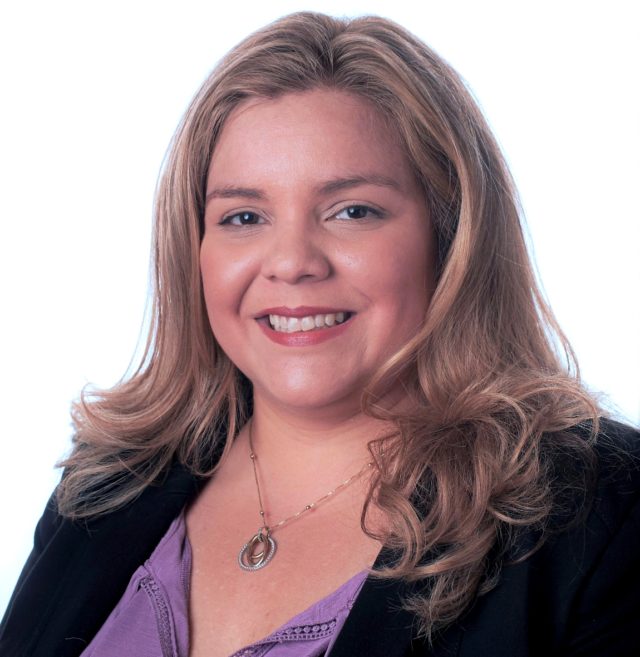“My research is [focused on] how to improve access, how to make sure that communities benefit from the research, and how to make life a little easier, at least on the healthcare side,” says Dr. Maria Mora Pinzón, a preventive medicine physician and scientist at the Wisconsin Alzheimer’s Institute at the University of Wisconsin-Madison who focuses her research on improving access to Alzheimer’s disease and related dementia (ADRD) services within the Latinx community.
Dr. Mora Pinzón was born and raised in Venezuela where she attended medical school in the city of Caracas. Before finding her way to the University of Wisconsin in 2015 for her preventive medicine residency, Dr. Mora Pinzón first moved to the United States to earn her master’s in clinical research at Rush University in Chicago and interned at Loyola University Medical School. Across all her positions and educational experiences, she has learned that there’s a lot that can be done to help our communities get the best care possible, leading her down the path of research on Alzheimer’s and dementia among the Latinx community.
“When I started working on assignments, I thought, ‘Latinos we don’t get that… that’s something that we don’t hear about in our communities.’ Oh, lo and behold, turns out Latinos, we have a 1.5 times more risk of developing Alzheimer’s,” says Dr. Mora Pinzon. “At least in the United States, we have a higher prevalence of chronic conditions, such as hypertension, diabetes. We are less likely to manage these conditions because of insurance issues, and lack of knowledge, lack of access to health care.
“My research is about making that connection, improving access to care, but also access includes, how do we get them more in our communities? How do we get the services that our community needs? And how can we make sure that when they go to a healthcare system or clinic, an office, they get the resources that they need, in the language that they want on the way that they want it.”
To further her line of research, the National Institute on Aging (NIA) recently awarded Dr. Mora Pinzón with a grant to fund her study: “Improving Access to Alzheimer’s disease and Related Dementias care services for Latinx individuals at Community Health Clinics.” This multiphase study will use mixed methods to gather information on factors that affect Latinx access to ADRD healthcare services. Ultimately, the final phase of the study will partner with one community health clinic to co-design a human-centered intervention to promote Latinx access to ADRD healthcare services.
Asides from her current research study, Dr. Mora Pinzón has also worked with the Latino Health Council to work on ways social media can be used to bridge gaps in Hispanic and Latinx communities, to better disseminate medically accurate information. When it comes to the use of social media among the Latinx community, Dr. Mora Pinzón has also taken part in co-founding a Twitter community for Latinx women who are either pursuing or have a career in the field of medicine.
Dr. Mora Pinzón tells Madison365 that while completing medical school in Venezuela, she never felt a sense of not belonging, and it wasn’t until she came to the United States that she saw this issue among Latinx undergraduate students pursuing medicine. To create a space of belonging, specifically for Latinas, Dr. Mora Pinzon, along with three other Latina professionals, created the Twitter account #LatinasinMedicine.
“It felt that even though there was many spaces and many communities, there was nothing for us. There was nothing that we could share our stories or share our wins or fears. So one day we said, okay let’s start our Twitter account… let’s create that space for Latinas in medicine that includes not only physicians, but also nurses, physician assistants, just to connect, just to amplify the things that we have seen,” says Dr. Mora Pinzón. “So that’s our hope, to help Latinas that are currently in the medical field and inspiring others to tell them you can do it.”
While Dr. Mora Pinzón believes everyone, no matter their background, should be more involved in helping marginalized communities, like the Latinx community, in understanding their culture and lived experiences to better health care services, she highlights the importance of having Latinx people working in health care positions. “It’s important that we have people that know the Latino community in every single aspect of research or health care because it’s that understanding of the culture, the experience, and being able to create those welcoming spaces,” she says.
“Reach out,” Dr. Mora Pinzon says by way of advice to other Latinx folk pursuing medicine. “It’s about asking for help, asking for resources, and telling people this is what I want to do. There’s always going to be what my mom calls your ‘little guardian angels’, people that are put in your life to help you to the next stage. And you won’t meet them unless you get out of your comfort zone and ask.”


































